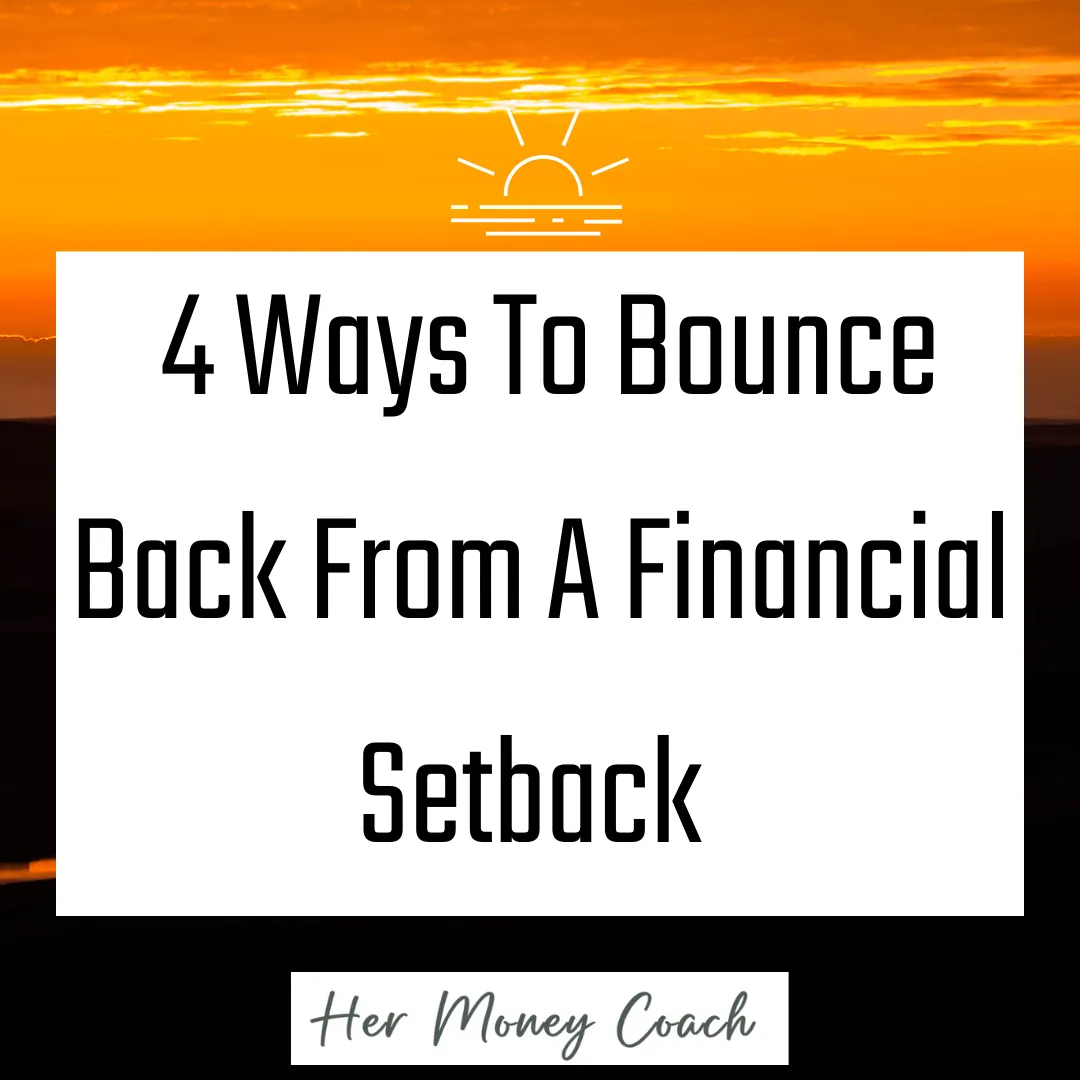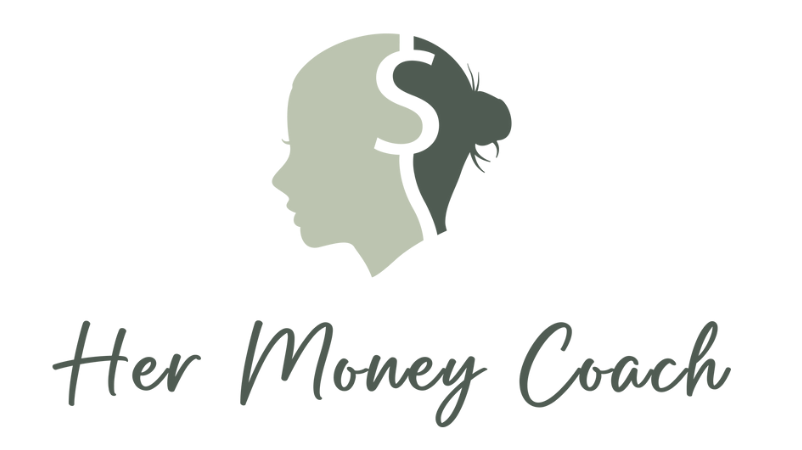
4 Ways To Bounce Back from a Financial Setback
“Money is only a tool. It will take you wherever you wish, but it will not replace you as the driver." - Ayn Rand
Navigate Unexpected Setbacks:
Life's unexpected twists often include financial setbacks, those unforeseen challenges that test our resolve.
But here's the silver lining: with the right mindset and actions, you can turn these hurdles into opportunities for growth.

With that said, here are 4 easy ways to bounce back from a money setback without succumbing to overwhelm! 👊
1. Conquer Money Blocks And Silence Your Inner Critic
Critical voices in your head: Money blocks are those subtle, insidious beliefs that silently control your money mindset. They are the critical voices in your head, remnants of your survival brain trying to protect you. You've heard them, they sound like this, "I suck at managing money", or “I'll never have enough money". These blocks often emerge from past experiences, shaping the lens through which you view money and success.
Identify your money blocks: It is crucial to process negative feelings before they spiral out of control, and put your inner critics at center stage. When that happens, it can be challenging to put the past behind you. Your ability to create a future, not repeat your past, hinges on addressing these blocks. Being stuck in them creates a sense of helplessness, impeding progress. Moreover, the negative emotions tied to your past create a self-fulfilling prophecy, reinforcing the belief that your future won't be any different.
Consider this: Your money beliefs are like a thermostat for your finances. Similar to how your home thermostat keeps a room within a specific temperature range, your internal money thermostat works based on what your brain sees as a "comfortable" bank account balance. For instance, if you get a windfall, your brain might tell your money thermostat to spend it right away, bringing you back to that familiar comfort zone. Our brains resist change because it feels uncomfortable. To break free from this cycle, you must broaden your money comfort zone by changing your money beliefs.
Meet Alexis, a 30 year old teacher who triumphed over financial setbacks rooted in childhood scarcity. She grew up in a very poor household where often the cupboards were bare and she and her 6 siblings often went days without a meal. Identifying and challenging money blocks was how Alexis started her transformative journey. Confronting critical voices and reframing perspectives, Alexis turned limitations into stepping stones, shedding the overwhelming sense of helplessness. The changed mindset not only put the past behind but attracted unforeseen opportunities. Alexis' story illustrates the power of breaking free from limiting beliefs, proving that with resilience and a shifted mindset, anyone can architect a new money story and pave the way to lasting well-being.
Overcome money blocks: Confront your blocks by challenging their validity and reframing your perspective on money. Simply ask yourself, "is this belief true, is it 100% true? If you look at it honestly, most likely it is not 100% true. This practice will help you avoid letting these negative beliefs run wild and spiral out of control. By consistently challenging and reshaping your money beliefs, you can break free from the cycle of limitations.
2. Harness Success Through An Unshakeable Belief
Believe in YOU! Understanding money strategies is essential, but the real game-changer is belief. If you don't truly believe in your ability to succeed financially, all the strategies in the world won't work. The core of bouncing back from a financial setback is having an unwavering belief that recovery isn't just possible—it's bound to happen.
Think about this: Have you ever heard of the placebo effect? It's a fascinating phenomenon in which a person experiences real improvements in health simply because they believe a treatment is effective, even if it has no therapeutic properties. This showcases the incredible influence our minds have on our physical realities.
Research says... Studies suggest that people with a positive mindset tend to make more informed financial decisions, take calculated risks, and exhibit resilience in the face of setbacks. The power of belief isn't just a motivational concept; it has a scientific basis in how our brains process information and make choices.
Sarah lost her job unexpectedly. Instead of succumbing to despair, Sarah chose to harness the power of belief. She spent time visualizing her ideal financial situation, setting clear goals, and consistently affirming her capability to overcome challenges. These practices ensured she took the actions to find new opportunities, and kept her confidence and positive. Her belief in her abilities not only landed her a new job but also opened other amazing doors. Sarah's story showcases that when belief becomes the driving force, it can turn adversity into a catalyst for growth.
You can cultivate belief today. Start small. Visualize your financial success regularly. Picture yourself achieving your goals and overcoming obstacles. Your brain responds to these positive images just like they are real which reinforces the belief that success is inevitable.
Affirmations are another powerful tool. Replace negative self-talk with positive statements about your financial capabilities. For example, instead of saying, "I can't handle my finances," shift it to, "I am capable of managing my money wisely."
Remember, the power of belief isn't a magical solution, but it's a fundamental step toward a resilient mindset that can guide you through financial challenges and lead you to success.
3. Master Your Money Dreams With Your Thoughts
Your responses matter: How you react to the events or circumstances in life have a significant influence over the outcomes you experience. Consider this: your thoughts about a situation, generate feelings that dictate the actions you take, in other words how you respond. The combination of these elements shapes the entirety of your life experiences.
Practical scenario: Let's break down this concept. Imagine a scenario where you receive an unexpected $1000 bonus. Your response to this windfall holds the key to the subsequent outcomes. If you choose to spend it on a weekend out, the outcome may result in temporary pleasure but lead to financial strain in the long run. However, if you decide to invest the bonus wisely, perhaps in stocks, a savings account, or a small business venture, the outcome could translate into a substantial increase in your net worth over time.
You have the power: If you find yourself dissatisfied with an outcome, the power to change lies in altering your response. Shift negative thoughts to positive ones, transforming the narrative you tell yourself. Adjust the scenarios you daydream about, envisioning success and positive experiences. Surround yourself with positive influences, people who uplift and inspire you. Modify how you talk to yourself and others, infusing conversations with optimism and encouragement.
Mandy faced a financial crossroads. Instead of succumbing to the stress of mounting debt, Mandy chose intentional responses. She shifted her mindset from despair to determination, visualizing a debt-free future. Mandy took actionable steps, consolidating his debts and crafting a budget. The outcome was transformative – not only did she eliminate his debts, but he also created financial habits that propelled her toward prosperity.
The takeaway: your responses are potent tools in shaping your destiny. Whether it's a financial windfall or a challenge, deliberate and positive responses can pave the way for success. By understanding and harnessing the power of intentional responses, you become the architect of a life rich in positive outcomes and fulfillment.
4. Create Momentum By Celebrating Small Wins
Celebrate small wins: Celebrating is the cornerstone for creating lasting momentum. The journey towards financial recovery is a collection of steps, each one deserving acknowledgment and celebration.
Reflect on a scenario where you celebrate every big and small achievement on your financial journey, just as if they are stepping stones on your path, with each step representing progress, no matter how minor.
Emma got divorced: After a challenging divorce, Emma found herself in the middle of financial challenges when she decided to celebrate paying off even the smallest of debts. Though seemingly insignificant given her huge pile of bills, by celebrating this action she triggered a cascade of positive emotions. This one small win started to build her confidence and reinforce the belief that recovery was not only possible but well underway.
The cumulative effect. Like droplets forming a river, these small wins amass to create a powerful force propelling you forward. Whether it's sticking to a budget for a month, saving a modest amount, or negotiating a lower bill, each accomplishment adds to the reservoir of your financial success. Every celebration, no matter how small, serves as a testament to your progress and resilience. It's a reminder that, even in the face of challenges, you are moving forward.
Follow these 4 steps and you will start to bounce back from your financial setback. This newfound resilience becomes the guiding force propelling you through challenges. Instead of viewing setbacks as roadblocks, you start to see them as stepping stones towards growth. Your journey is defined not by the setbacks you encounter but by your ability to overcome them, emerge stronger, and create your future dreams.
Legal Disclaimer: This content is not financial advice and is for informational purposes only. Always consult with a qualified financial professional before making any financial decisions.
